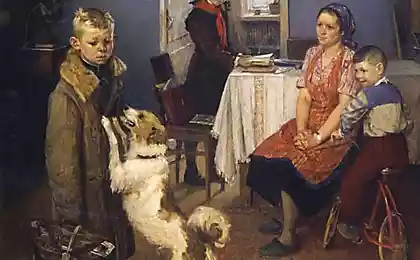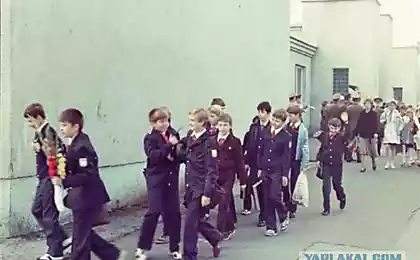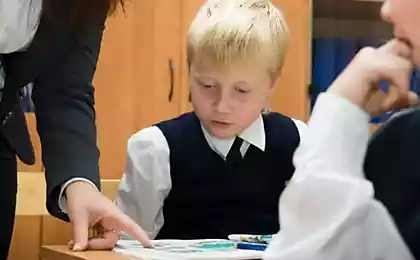445
The secret of school success: why do some children learn well and others badly?
What drives children's successes and failures? Level of education parents? No, this is too straightforward an answer. And from what then? This riddle was solved the St. Petersburg sociologists
Do you have children who are destined for school failure? Do you have children who even before birth is destined to become a students?
Most often, scientists cite the rectilinear response of international experts, contained in the international comparative studies PISA (Programme for International Student Assessment) and TIMSS (Trends in Mathematics and Science Study): "Children from families with higher family cultural capital demonstrate higher educational outcomes".
Twenty eight million eight hundred thirty three thousand three hundred forty eight
F. P. Reshetnikov "deuce Again", 1952
But if this is true, why many of the children, "bequeathed" them with high cultural capital, and can not realize itself? What's stopping them: the indifference of the teachers, overloaded, or their own laziness? Or the presence of classmates whose school failure is fatal predefined room in a communal apartment and drinking parents?
"In fact, many of the factors that we considered important, do not affect the performance of children – sure, Olga Saczawa, candidate of philological Sciences, postgraduate programme "education Management", Higher school of Economics (Saint-Petersburg). – And what's really important, us not paying attention!…»
Russia in miniatureStudies of success and failure of children in the education system is one of the global trends, which manifested itself in 90-e years when at the same time in many countries the unfolding of the global reform of national education systems.
Saczawa Olga – candidate of Philology and the Director of studies on educational work of one of St. Petersburg schools – not asked new questions, but some of the old issues she managed to find new answers.
And this is probably due to her school. The school is located on Vasilyevsky island in Saint Petersburg.In length this island a little more than six kilometers, a maximum width of four kilometres. With Petersburg it connect four drawbridges. From late April to late October, during the navigation period on the Neva river, divorcing bridges every night.
This is the most populated island of Russia. At every square kilometer is inhabited by more than 11 thousand inhabitants.
In the early 19th century the island had a monopoly on all science and education of the city: it housed the St. Petersburg Academy of Sciences, the Academy of Sciences library, University, Academy of fine Arts. And now it's flooded by a wave nerazdelennaya communal apartments. In the next room, leaving the doors into the corridor (with high stucco window of the 19th century), inhabited by descendants of the indigenous citizens and families from the South or the far North of Russia.
The majority of inhabitants of Vasilevsky island – migrants. Some are looking for a better life for themselves and their children. Others were here, as once the heroes of the novels of the St. Petersburg writers – just because they have nowhere else to go. According to them, if you die, then on Vasilievsky island. "30% of our pupils from socially unprotected layers of the population," – tell me teacher.
We do not need to know anything more about this school. Let's just say she is on the island, which, in itself, is Russia in miniature.And Olga Saczawa, the head teacher and the rector of the Higher school of Economics, wanted to learn about Russia something new.
Wealth is uselessSociological research – a lot of paperwork and many questions. Most of the issues (sure, the respondents, i.e. the research participants) is generally not the case. Why not always answer these questions honestly. But the questionnaire is designed so that sociologists always have the opportunity to test the sincerity of the responses. The questionnaire, which she distributed to the parents of students of all grades (2 through 11) included 5 sets of questions. Four blocks – questions about the family. Fifth – the child and his progress.
"Initially we hoped to answer the question, does the school success of children, material prosperity and the living conditions of their families", – says Olga Saczawa, But direct dependence on the material wealth we have not found.
"The majority of participants of our poll – continues to Olga, – the inhabitants of St. Petersburg communal. Only 20% of families live in separate apartments. Family of straight-a students and C students in roughly equal proportions live in communal apartments in separate apartments. Had to doconclusion: furnished communal flats does not prevent the child be successful in school.
Does not affect the performance of children and the family home library. In families 73% honors home houses more than 200 books, but 75% of the families of the students also stated that their family library consists of 100 books. Family 5% of achievers and 6% of students owned a large library (over 1000 books). It is difficult to find a correlation, right?
An important issue of concern to all: does parental income on children? Can we say (as some do) that at low levels of family income, the child is doomed to get bad grades?
Our study answers unequivocally: no.
The survey involved low-income families, with incomes for the least 5,000 rubles a month. It is from these families were 26% of all Threeness, and... 30% of all honors! Standouts in low-income families were even more than the Threeness.
Income 20% of families honors and 24% of families of students amounted to 20 000 rubles per person. 25% honors 21% of students stated income over 20,000 roubles per family member. The proportions in this case are comparable. And we come back to the same mystery. In one case, children from poor (or, conversely, wealthy families) why go to school at three, another five!".
– And you took into account that families with high incomes have more financial opportunities? For example, can hire Tutors for their children?
– Yes, and, as a rule, employ. But most often parents cannot compensate for the lack of family contributions to the education of the child (Tutors, paid courses, etc.). These deposits simply do not work.
Material prosperity and even wealth of the family itself is not able to positively influence the school success of children.
Affected more. And now we come to the most interesting.
The condition of the first, the unexpected – grandmotherA study conducted among families on the island proved that it is possible to prepare lessons on the kitchen table in a communal and to top. You can have a private room, and be a C student. No matter where you live. Important – with whom.
Well, it turned out that 50% of excellent students and horoshist live in the same apartment with her grandparents.
And 42% of achievers children to communicate with older relatives, even if they live in another city. Threeness in 40% of cases do not meet the grandparents. And 5% of children with low achievers reported that never in my life seen older relatives.
"It is only at first glance seems surprising. On the school progress of the child at all levels of education directly affect the value of his family, – says Olga Saczawa. – What is more important for adult relationships within their families, the greater the value is for the parents of the student's family life (including relations with older relatives), the more attention the parents pay to build its ties, the higher the school grades of their child. Well-built family relations indicate psychological competence of parents. Therefore, they can be called the key factor in determining the academic performance of the child."
Condition the second, even more unexpected – a family holiday And in this context should not seem unusual following example, – continues Olga Saczawa. – Our research showed that 67% of and b students of primary school and 73% a and b students high school live in families where family always celebrated holidays. But in families the majority of students these holidays are celebrated occasionally. Or not marked at all!
It is very important that a family celebration was not improvised (gathered, drank, ran). It is necessary that the family were prepared for it: discussed the presents, set the festive table, developed the script of the holiday, making costumes, sent family and friends invitations, etc.
We found an interesting pattern: the higher the family income and the lower the culture of family celebrations, the lower scores of the child.
And Vice versa: the higher the culture of family holidays in relation to family income (middle or low) the higher the academic performance of the student!
We started talking about family celebrations. There is a belief that almost 100% of cases, two circumstances destructive impact on children: the drunkenness of one parent and (or) their divorce. Your research confirms this?
– From the beginning we wondered, does the drunkenness of parents on academic performance of children. This question is just "on the surface". But it turned out that the fact of drunkenness, by itself, without combination with other factors, is not significant for poor academic performance of the child. Moreover, when parents say: "Yes, in our family there is a problem and we're working on it" when moms and dads start to really do something in this direction, it breaks the negative trend that could affect the academic performance of the student. Negative kompensiruet constructive attitude of parents: they recognized the problems existing in family relationships, and strive to solve them.
For example, some parents of pupils of 5-9 classes said in the survey about the serious problems in one or more areas of family relationships. We would have to think that their children – if we are to believe the generally accepted schemes – learn bad? Yes not at all! 90% of these parents children learn at 4 and 5! Why?
It's just that these parents are making real strides to solve its family problems. We know this by studying their questionnaires.
In international studies it is often stressed: the higher the education level of parents, the better their child's learning. But this is not so.
For example, 64% of moms and dads honors from elementary school, participated in our study have higher education and 20% of families honors from elementary school one of the parents has even two higher educations. 68% of Trinity's parents have only secondary education. Everything seemed to be right as in the research? Either.
If elementary school only every fifth parent of a C student had higher education (21%) in primary school are two times more likely (43%). That is, over time, children of highly educated parents, too, can become students.
But we hardly should be surprised that 85% of excellent students and horoshist, participated in the study live in two-parent families (where the father and mother are to the child family). Only 5% of excellent students and horoshist live with a stepmother or stepfather. As for the Trinity, the situation is opposite: more than half of them (55%) live in single-parent families!
I want to stress that life in a single-parent family does not predetermine low school results. We know even the best students (10% of total sample) who are brought up in single-parent families. Usually their mother or father declare that you deliberately do not enter into a new marriage, to devote himself to the child.
But most often to the status of single-parent families leads to a series of successive parent errors. In some situations the parents behave is not enough constructively. And — do not think that it will pay for their children.
Be satisfied with their lives – and your children will get good grades In fact, in your research you have come to the conclusion that the school success of the child is influenced by parents. But then could you draw me a portrait of the ideal parent? About whom we can say: their children will (if they have, of course, ability to learn) to learn from the "good" and "excellent"?
– If for parents the important value of family relations, next in importance to value professional fulfillment. Perhaps this worldview and attitudes of parents towards child labour is perceived as the norm and implements in relation to own work and training activities.
According to a study conducted on Vasilievsky island, 56% of parents of excellent students and horoshist said that the work in the first place, for self-realization. They not only moral satisfaction, but also about the pleasure of their professional activities. Only 20% of parents of students said that working for the sake of self-realization. Most of them work, in their own words, "for the money".
Another important subjective feature that distinguishes a family of movers and horoshist, from the families of Trinity. Oddly enough, it is – life satisfaction.
This was told by 91% of parents of excellent students and horoshist, and only 62% of parents of underachievers. I think that many readers may deem this statement or deception or self-deception.
After all, 30% of the families of movers and horoshist, participated in the study belong to low-income families. And most of them live in communal apartments.
The more satisfied with life parents, the more successful in the education of their children, – says Olga Saczawa. – This is a pattern. 23% of parents of students answered that they are not fully satisfied with their life and 9% stated that their private life does not like it. Among parents of honors "unhappy" at all. At all levels of education (from elementary to high school) dissatisfied with life parents are usually not satisfied and academic achievements of their child. I think every educator is familiar with this character – "a child dissatisfied parents." His parents always think that the main resource for the development of their offspring is not their own family, and communication with classmates from families with higher social status. If these classmates there, the family again and again looking for the offspring of another school. But "child dissatisfied parents" and the school continues to learn unsatisfactory. Because his problems – not in school and not classmates. His problems with the family.
— And yet, I think most readers, having reached this place, does not believe that the material situation of the family in reality it means little to student success. And that personal feeling of happiness that parents feel is much more important for their children
– In fact, it shows more complex relationships. We came to the conclusion that the students do not correlate with objective economic and financial conditions in which the family lives (which, as we have seen, can be identical and honors, and the Trinity), and with the value system of their parents. Including – the economic competence of parents, with their desire and ability to invest in the future of his family. This competence is expressed through the relationship between income and the quality of the physical environment that is family with this income could provide. That is, in the first place again nominated personality of parents, their relationships with friends and the world around them.
Take for example the average family honors or b + in our study. Such a family has an income of 5000-10000 rubles a month per person, the country in 62% of cases, the machine is 35 % of cases (housing issue is not resolved, 70 %). Parents of students with triples at the same level of income in the family have a cottage only in 36 % of cases and in 27 %. (housing issue is not resolved in 90% of cases). But most interesting is that even at higher incomes (exceeding 20,000 rubles per month per person) the parents of the students still can't buy a house or car. So, we are talking primarily about the economic incompetence of these families, about their inability to manage family finances.
Therefore, in families with relatively low income but a higher level objective environment (apartment, car, cottage), the children show higher educational results than in those families where income levels are relatively high, but the quality of the objective environment below.
— The study, of which we speak, was the basis of your master's thesis written in the national research UNIVERSITY-Higher school of Economics (St. Petersburg). In every thesis there is a section "insights". What conclusions would you have done?
I think we, teachers, have made and make the mistake of investing only in computers, books, educational equipment for schools and for families. We hoped that these investments will enhance the academic performance of children. Really need to invest in purposeful engagement with families in the formation of parents and children the necessary values and competencies. But how to do it – I don't know. Let's think together.published
P. S. And remember, only by changing their consumption — together we change the world! ©
Join us in Facebook , Vkontakte, Odnoklassniki
Source: miloserdie.ru/article/tajna-shkolnoj-uspevaemosti-pochemu-odni-deti-uchatsya-horosho-a-drugie-ploho/
Do you have children who are destined for school failure? Do you have children who even before birth is destined to become a students?
Most often, scientists cite the rectilinear response of international experts, contained in the international comparative studies PISA (Programme for International Student Assessment) and TIMSS (Trends in Mathematics and Science Study): "Children from families with higher family cultural capital demonstrate higher educational outcomes".
Twenty eight million eight hundred thirty three thousand three hundred forty eight
F. P. Reshetnikov "deuce Again", 1952
But if this is true, why many of the children, "bequeathed" them with high cultural capital, and can not realize itself? What's stopping them: the indifference of the teachers, overloaded, or their own laziness? Or the presence of classmates whose school failure is fatal predefined room in a communal apartment and drinking parents?
"In fact, many of the factors that we considered important, do not affect the performance of children – sure, Olga Saczawa, candidate of philological Sciences, postgraduate programme "education Management", Higher school of Economics (Saint-Petersburg). – And what's really important, us not paying attention!…»
Russia in miniatureStudies of success and failure of children in the education system is one of the global trends, which manifested itself in 90-e years when at the same time in many countries the unfolding of the global reform of national education systems.
Saczawa Olga – candidate of Philology and the Director of studies on educational work of one of St. Petersburg schools – not asked new questions, but some of the old issues she managed to find new answers.
And this is probably due to her school. The school is located on Vasilyevsky island in Saint Petersburg.In length this island a little more than six kilometers, a maximum width of four kilometres. With Petersburg it connect four drawbridges. From late April to late October, during the navigation period on the Neva river, divorcing bridges every night.
This is the most populated island of Russia. At every square kilometer is inhabited by more than 11 thousand inhabitants.
In the early 19th century the island had a monopoly on all science and education of the city: it housed the St. Petersburg Academy of Sciences, the Academy of Sciences library, University, Academy of fine Arts. And now it's flooded by a wave nerazdelennaya communal apartments. In the next room, leaving the doors into the corridor (with high stucco window of the 19th century), inhabited by descendants of the indigenous citizens and families from the South or the far North of Russia.
The majority of inhabitants of Vasilevsky island – migrants. Some are looking for a better life for themselves and their children. Others were here, as once the heroes of the novels of the St. Petersburg writers – just because they have nowhere else to go. According to them, if you die, then on Vasilievsky island. "30% of our pupils from socially unprotected layers of the population," – tell me teacher.
We do not need to know anything more about this school. Let's just say she is on the island, which, in itself, is Russia in miniature.And Olga Saczawa, the head teacher and the rector of the Higher school of Economics, wanted to learn about Russia something new.
Wealth is uselessSociological research – a lot of paperwork and many questions. Most of the issues (sure, the respondents, i.e. the research participants) is generally not the case. Why not always answer these questions honestly. But the questionnaire is designed so that sociologists always have the opportunity to test the sincerity of the responses. The questionnaire, which she distributed to the parents of students of all grades (2 through 11) included 5 sets of questions. Four blocks – questions about the family. Fifth – the child and his progress.
"Initially we hoped to answer the question, does the school success of children, material prosperity and the living conditions of their families", – says Olga Saczawa, But direct dependence on the material wealth we have not found.
"The majority of participants of our poll – continues to Olga, – the inhabitants of St. Petersburg communal. Only 20% of families live in separate apartments. Family of straight-a students and C students in roughly equal proportions live in communal apartments in separate apartments. Had to doconclusion: furnished communal flats does not prevent the child be successful in school.
Does not affect the performance of children and the family home library. In families 73% honors home houses more than 200 books, but 75% of the families of the students also stated that their family library consists of 100 books. Family 5% of achievers and 6% of students owned a large library (over 1000 books). It is difficult to find a correlation, right?
An important issue of concern to all: does parental income on children? Can we say (as some do) that at low levels of family income, the child is doomed to get bad grades?
Our study answers unequivocally: no.
The survey involved low-income families, with incomes for the least 5,000 rubles a month. It is from these families were 26% of all Threeness, and... 30% of all honors! Standouts in low-income families were even more than the Threeness.
Income 20% of families honors and 24% of families of students amounted to 20 000 rubles per person. 25% honors 21% of students stated income over 20,000 roubles per family member. The proportions in this case are comparable. And we come back to the same mystery. In one case, children from poor (or, conversely, wealthy families) why go to school at three, another five!".
– And you took into account that families with high incomes have more financial opportunities? For example, can hire Tutors for their children?
– Yes, and, as a rule, employ. But most often parents cannot compensate for the lack of family contributions to the education of the child (Tutors, paid courses, etc.). These deposits simply do not work.
Material prosperity and even wealth of the family itself is not able to positively influence the school success of children.
Affected more. And now we come to the most interesting.
The condition of the first, the unexpected – grandmotherA study conducted among families on the island proved that it is possible to prepare lessons on the kitchen table in a communal and to top. You can have a private room, and be a C student. No matter where you live. Important – with whom.
Well, it turned out that 50% of excellent students and horoshist live in the same apartment with her grandparents.
And 42% of achievers children to communicate with older relatives, even if they live in another city. Threeness in 40% of cases do not meet the grandparents. And 5% of children with low achievers reported that never in my life seen older relatives.
"It is only at first glance seems surprising. On the school progress of the child at all levels of education directly affect the value of his family, – says Olga Saczawa. – What is more important for adult relationships within their families, the greater the value is for the parents of the student's family life (including relations with older relatives), the more attention the parents pay to build its ties, the higher the school grades of their child. Well-built family relations indicate psychological competence of parents. Therefore, they can be called the key factor in determining the academic performance of the child."
Condition the second, even more unexpected – a family holiday And in this context should not seem unusual following example, – continues Olga Saczawa. – Our research showed that 67% of and b students of primary school and 73% a and b students high school live in families where family always celebrated holidays. But in families the majority of students these holidays are celebrated occasionally. Or not marked at all!
It is very important that a family celebration was not improvised (gathered, drank, ran). It is necessary that the family were prepared for it: discussed the presents, set the festive table, developed the script of the holiday, making costumes, sent family and friends invitations, etc.
We found an interesting pattern: the higher the family income and the lower the culture of family celebrations, the lower scores of the child.
And Vice versa: the higher the culture of family holidays in relation to family income (middle or low) the higher the academic performance of the student!
We started talking about family celebrations. There is a belief that almost 100% of cases, two circumstances destructive impact on children: the drunkenness of one parent and (or) their divorce. Your research confirms this?
– From the beginning we wondered, does the drunkenness of parents on academic performance of children. This question is just "on the surface". But it turned out that the fact of drunkenness, by itself, without combination with other factors, is not significant for poor academic performance of the child. Moreover, when parents say: "Yes, in our family there is a problem and we're working on it" when moms and dads start to really do something in this direction, it breaks the negative trend that could affect the academic performance of the student. Negative kompensiruet constructive attitude of parents: they recognized the problems existing in family relationships, and strive to solve them.
For example, some parents of pupils of 5-9 classes said in the survey about the serious problems in one or more areas of family relationships. We would have to think that their children – if we are to believe the generally accepted schemes – learn bad? Yes not at all! 90% of these parents children learn at 4 and 5! Why?
It's just that these parents are making real strides to solve its family problems. We know this by studying their questionnaires.
In international studies it is often stressed: the higher the education level of parents, the better their child's learning. But this is not so.
For example, 64% of moms and dads honors from elementary school, participated in our study have higher education and 20% of families honors from elementary school one of the parents has even two higher educations. 68% of Trinity's parents have only secondary education. Everything seemed to be right as in the research? Either.
If elementary school only every fifth parent of a C student had higher education (21%) in primary school are two times more likely (43%). That is, over time, children of highly educated parents, too, can become students.
But we hardly should be surprised that 85% of excellent students and horoshist, participated in the study live in two-parent families (where the father and mother are to the child family). Only 5% of excellent students and horoshist live with a stepmother or stepfather. As for the Trinity, the situation is opposite: more than half of them (55%) live in single-parent families!
I want to stress that life in a single-parent family does not predetermine low school results. We know even the best students (10% of total sample) who are brought up in single-parent families. Usually their mother or father declare that you deliberately do not enter into a new marriage, to devote himself to the child.
But most often to the status of single-parent families leads to a series of successive parent errors. In some situations the parents behave is not enough constructively. And — do not think that it will pay for their children.
Be satisfied with their lives – and your children will get good grades In fact, in your research you have come to the conclusion that the school success of the child is influenced by parents. But then could you draw me a portrait of the ideal parent? About whom we can say: their children will (if they have, of course, ability to learn) to learn from the "good" and "excellent"?
– If for parents the important value of family relations, next in importance to value professional fulfillment. Perhaps this worldview and attitudes of parents towards child labour is perceived as the norm and implements in relation to own work and training activities.
According to a study conducted on Vasilievsky island, 56% of parents of excellent students and horoshist said that the work in the first place, for self-realization. They not only moral satisfaction, but also about the pleasure of their professional activities. Only 20% of parents of students said that working for the sake of self-realization. Most of them work, in their own words, "for the money".
Another important subjective feature that distinguishes a family of movers and horoshist, from the families of Trinity. Oddly enough, it is – life satisfaction.
This was told by 91% of parents of excellent students and horoshist, and only 62% of parents of underachievers. I think that many readers may deem this statement or deception or self-deception.
After all, 30% of the families of movers and horoshist, participated in the study belong to low-income families. And most of them live in communal apartments.
The more satisfied with life parents, the more successful in the education of their children, – says Olga Saczawa. – This is a pattern. 23% of parents of students answered that they are not fully satisfied with their life and 9% stated that their private life does not like it. Among parents of honors "unhappy" at all. At all levels of education (from elementary to high school) dissatisfied with life parents are usually not satisfied and academic achievements of their child. I think every educator is familiar with this character – "a child dissatisfied parents." His parents always think that the main resource for the development of their offspring is not their own family, and communication with classmates from families with higher social status. If these classmates there, the family again and again looking for the offspring of another school. But "child dissatisfied parents" and the school continues to learn unsatisfactory. Because his problems – not in school and not classmates. His problems with the family.
— And yet, I think most readers, having reached this place, does not believe that the material situation of the family in reality it means little to student success. And that personal feeling of happiness that parents feel is much more important for their children
– In fact, it shows more complex relationships. We came to the conclusion that the students do not correlate with objective economic and financial conditions in which the family lives (which, as we have seen, can be identical and honors, and the Trinity), and with the value system of their parents. Including – the economic competence of parents, with their desire and ability to invest in the future of his family. This competence is expressed through the relationship between income and the quality of the physical environment that is family with this income could provide. That is, in the first place again nominated personality of parents, their relationships with friends and the world around them.
Take for example the average family honors or b + in our study. Such a family has an income of 5000-10000 rubles a month per person, the country in 62% of cases, the machine is 35 % of cases (housing issue is not resolved, 70 %). Parents of students with triples at the same level of income in the family have a cottage only in 36 % of cases and in 27 %. (housing issue is not resolved in 90% of cases). But most interesting is that even at higher incomes (exceeding 20,000 rubles per month per person) the parents of the students still can't buy a house or car. So, we are talking primarily about the economic incompetence of these families, about their inability to manage family finances.
Therefore, in families with relatively low income but a higher level objective environment (apartment, car, cottage), the children show higher educational results than in those families where income levels are relatively high, but the quality of the objective environment below.
— The study, of which we speak, was the basis of your master's thesis written in the national research UNIVERSITY-Higher school of Economics (St. Petersburg). In every thesis there is a section "insights". What conclusions would you have done?
I think we, teachers, have made and make the mistake of investing only in computers, books, educational equipment for schools and for families. We hoped that these investments will enhance the academic performance of children. Really need to invest in purposeful engagement with families in the formation of parents and children the necessary values and competencies. But how to do it – I don't know. Let's think together.published
P. S. And remember, only by changing their consumption — together we change the world! ©
Join us in Facebook , Vkontakte, Odnoklassniki
Source: miloserdie.ru/article/tajna-shkolnoj-uspevaemosti-pochemu-odni-deti-uchatsya-horosho-a-drugie-ploho/























